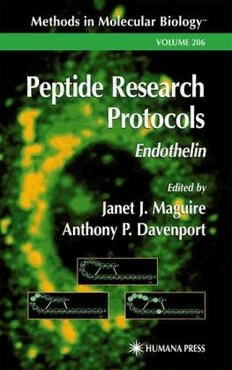
Peptide Research Protocols: Endothelin PDF
189 Pages·2002·1.883 MB·English
Most books are stored in the elastic cloud where traffic is expensive. For this reason, we have a limit on daily download.
Preview Peptide Research Protocols: Endothelin
Description:
Tantalizing new research frontiers are opening in peptide research, where the endothelins constitute an important class of signals that can be manipulated therapeutically to treat cardiovascular disease. In Peptide Research Protocols: Endothelin, a panel of multidisciplinary experts describes in detail readily reproducible methods to investigate all aspects of peptide research by focusing on the endothelin system-from its synthesis and metabolism, to its function in health and disease. These methods use state-of-the-art molecular techniques to quantify the expression of mRNA, here using both endothelin receptors and the endothelin-converting enzymes. They show how peptides, precursors, receptors, and synthetic enzymes can be localized and quantified in plasma, culture supernatants, tissue homogenate, and tissue sections using antibodies, and how radioligand binding techniques can provide additional information on receptor characterization. In vitro assays are presented to determine the function of peptides in isolated preparations, to characterize new receptor ligands, and to provide information on the tissue-specific processing of precursor peptides-all in the endothelin system. Several in vivo protocols illustrate the role of the endothelin peptides in healthy human individuals and describe animal models that can be used to predict the therapeutic potential of cardiovascular drugs that manipulate endothelin synthesis or function. Authoritative and timely, Peptide Research Protocols: Endothelin provides both a comprehensive introduction to endothelin biology and an up-to-date collection of proven techniques and experimental strategies for use in peptide research today.
See more
The list of books you might like
Most books are stored in the elastic cloud where traffic is expensive. For this reason, we have a limit on daily download.
